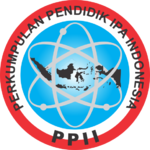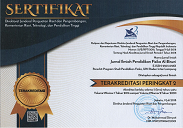Penerapan Pembelajaran Berbasis Masalah Melalui Metode Eksperimen dan Demonstrasi Ditinjau dari Kemampuan Menggunakan Alat Ukur dan Sikap Ilmiah Siswa
Abstract
The purpose of this study is to know: the influence of experimental and demonstration learning methods to the learning achievement, the influence of the ability to use measuring tools, the influence of scientific attitude, the interaction between learning methods with the ability to use measuring instruments on learning achievement, (5) the interaction between learning methods with scientific attitude , the interaction between the ability to use a measuring instrument with a scientific attitude, the interaction between learning methods with the ability to use measuring tools and scientific attitudes. This research uses experimental method (experimental research). The study sample was determined randomly by technique cluster random sampling of two classes. Experiment 1 class with experiment method and experiment class 2 with demonstration method. Technique of collecting data using test method to get data of cognitive learning achievement and ability to use measuring instrument, whereas questionnaire method to get information of scientific attitude and affective learning achievement. The research hypothesis test using threeway anova with 2x2x2 factorial design and cell frequency is not the same. From the result of the research, it can be concluded that: (1) There is no influence of the use of experimental and demonstration method to cognitive achievement (p-value = 0,151) and affective ( p-value = 0,368). (2) There is no influence of ability to use measuring instrument to cognitive achievement (p-value =0,593) and affective ( p-value = 726). (3) There is no influence of scientific attitude toward cognitive achievement (p-value = 0,399) and affective ( p-value = 0,084). (4) There is no interaction between the learning method with the ability to use the measuring instrument to cognitive achievement ( p-value = 0.832). (5) There is no interaction between learning method and scientific attitude toward cognitive achievement (p-value = 0,839). (6) There is no interaction between the ability to use a measuring instrument with a scientific attitude toward cognitive achievement ( p-value = 318). (7) There is an interaction between learning methods with the ability to use measuring tools and scientific attitudes toward cognitive achievement (p-value =0,029).
Tujuan penelitian ini adalah untuk mengetahui: pengaruh metode pembelajaran eksperimen dan demonstrasi terhadap prestasi belajar, pengaruh kemampuan menggunakan alat ukur, pengaruh sikap ilmiah, interaksi antara metode pembelajaran dengan kemampuan menggunakan alat ukur terhadap prestasi belajar, (5) interaksi antara metode pembelajaran dengan sikap ilmiah, interaksi antara kemampuan menggunakan alat ukur dengan sikap ilmiah, interaksi antara metode pembelajaran dengan kemampuan menggunakan alat ukur dan sikap ilmiah. Penelitian ini menggunakan metode eksperimental (experimental research). Sampel penelitian ditentukan secara acak dengan teknik cluster random sampling sebanyak dua kelas. Kelas eksperimen 1 dengan metode eksperimen dan kelas eksperimen 2 dengan metode demonstrasi. Uji hipotesis penelitian menggunakan anava tiga jalan dengan desain faktorial 2x2x2 dan frekuensi sel tidak sama. Dari hasil penelitian dapat disimpulkan bahwa: 1) Tidak ada pengaruh penggunaan metode pembelajaran eksperimen dan demonstrasi terhadap prestasi kognitif (p-value = 0,151) dan afektif (p-value = 0,368); 2) Tidak ada pengaruh kemampuan menggunakan alat ukur terhadap prestasi kognitif (p-value = 0,593) dan afektif (p-value = 726); 3) Tidak ada pengaruh sikap ilmiah terhadap prestasi kognitif (p-value = 0,399) dan afektif (p-value = 0,084); 4) Tidak ada interaksi antara metode pembelajaran dengan kemampuan menggunakan alat ukur terhadap prestasi kognitif (p-value = 0,832); 5) Tidak ada interaksi antara metode pembelajaran dengan sikap ilmiah terhadap prestasi kognitif (p-value = 0,839); 6) Tidak ada interaksi antara kemampuan menggunakan alat ukur dengan sikap ilmiah terhadap prestasi kognitif (p-value = 318); 7) Ada interaksi antara metode pembelajaran dengan kemampuan menggunakan alat ukur dan sikap ilmiah terhadap prestasi kognitif (p-value = 0,029).
Keywords
Full Text:
PDFReferences
Bell, T., Urhahne, D., Schanze, S., & Ploetzner, R. (2010). Collaborative inquiry learning: Models, tools, and challenges. International journal of science education, 32(3), 349-377.
de Jong, T., & Lazonder, A. W. (2014). 15 The Guided Discovery Learning Principle in Multimedia Learning. The Cambridge handbook of multimedia learning, 371.
Pepper, C. (2008). Implementing problem based learning in a science faculty. Issues in Educational Research, 18(1), 60-72.
Hung, W., Jonassen, D. H., & Liu, R. (2008). Problem-based learning. Handbook of research on educational communications and technology, 3, 485-506.
Jonassen, D. H., & Hung, W. (2008). All problems are not equal: Implications for problem-based learning. Interdisciplinary Journal of Problem-Based Learning, 2(2), 4.
Kuhlthau, C. C., Maniotes, L. K., & Caspari, A. K. (2015). Guided Inquiry: Learning in the 21st Century: Learning in the 21st Century. ABC-CLIO.
Suparno, P. (2007). Metode Pembelajaran Fisika Konstruktivistik Dan Menyenangkan. Universitas Sanata Dharma Yogyakarta.
Dwijananti, P., & Yulianti, D. (2010). Pengembangan kemampuan berpikir kritis mahasiswa melalui pembelajaran problem based instruction pada mata kuliah fisika lingkungan. Jurnal Pendidikan Fisika Indonesia, 6(2).
Hutagaol, K. (2013). Pembelajaran kontekstual untuk meningkatkan kemampuan representasi matematis siswa sekolah menengah pertama. Infinity Journal, 2(1), 85-99.
Saregar, A., Sunarno, W., & Cari, C. (2013). Pembelajaran Fisika Kontekstual Melalui Metode Eksperimen Dan Demonstrasi Diskusi Menggunakan Multimedia Interaktif Ditinjau Dari Sikap Ilmiah Dan Kemampuan Verbal Siswa. Inkuiri, 2(02).
Walker, A., & Leary, H. (2009). A problem based learning meta analysis: Differences across problem types, implementation types, disciplines, and assessment levels. Interdisciplinary Journal of Problem-based Learning, 3(1), 6.
Cahyono, W. D. (2007). Pengaruh Penggunaan Pendekatan Pembelajaran Berbasis Masalah Dengan Metode Demonstrasi dan Diskusi Terhadap Prestasi Belajar Fisika Ditinjau Dari Kreativitas Siswa. UNS: Tesis.
DOI: http://dx.doi.org/10.24042/jipfalbiruni.v4i2.97
Refbacks
- There are currently no refbacks.

Jurnal ilmiah pendidikan fisika Al-Biruni is licensed under a Creative Commons Attribution-ShareAlike 4.0 International License.
![]()







